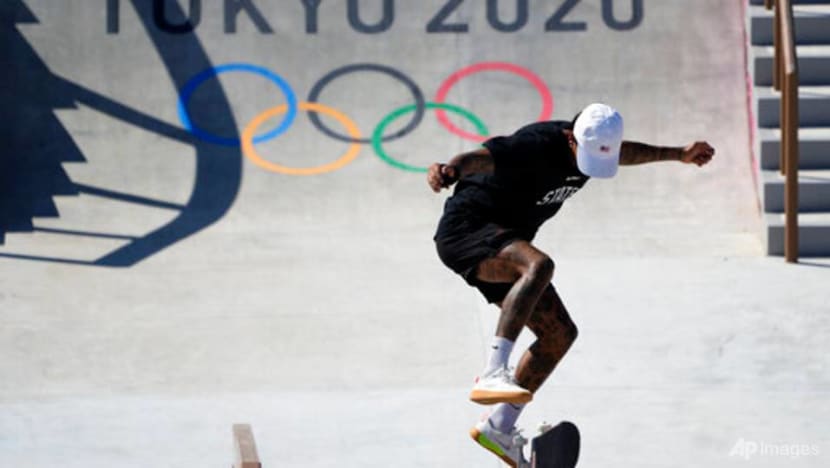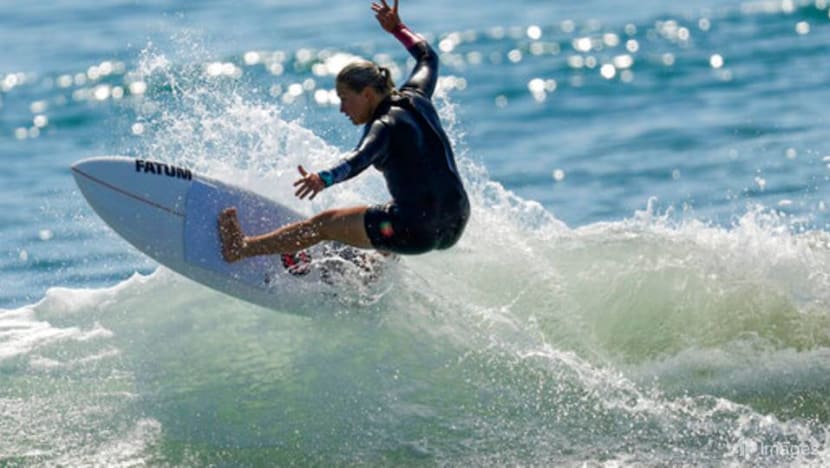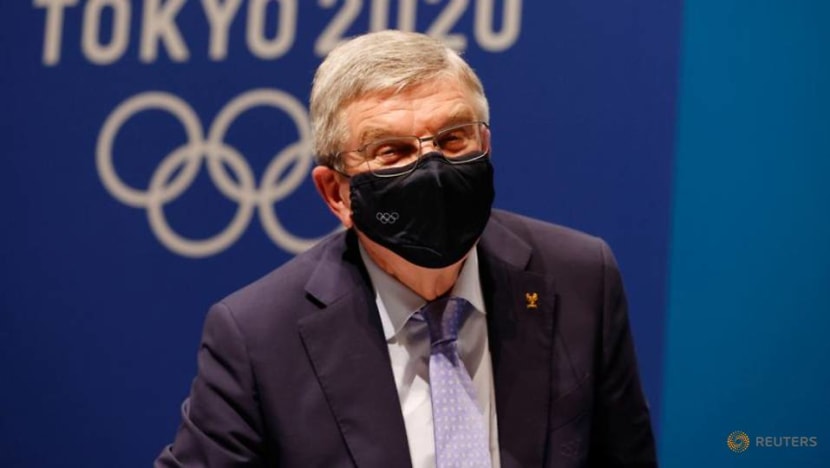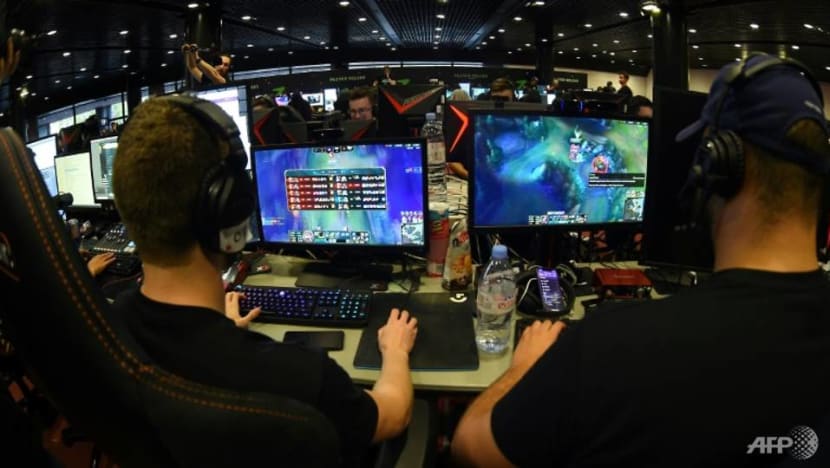Commentary: Five new sports were added to Tokyo Olympics. Here’s what might be included next
The Olympics has a long and storied history. It has been accused of having bloated budgets and catering to money rather than sports. But exactly how should the games evolve? John Duerden weighs in.

Nyjah Huston, of the United States, trains during a street skateboarding practice session at the 2020 Summer Olympics, Wednesday, July 21, 2021, in Tokyo, Japan. (AP Photo/Gregory Bull)
SINGAPORE: There are five new sports at the 2020 Olympics that started in Tokyo on Jul 23.
Skateboarding, karate, surfing, baseball/softball and sports climbing will all be giving out gold, silver and bronze medals for the first time.
While those standing on the podium will be deservedly proud of their efforts and skills, there is room for debate as to how the Olympics should evolve.
The games, which take place every four years, should change with the times. The world is a very different place in 2021 when compared to 1964 when Tokyo first hosted the Olympics.
READ: Commentary: Olympic football matters more than most people think – at least for Asian teams
The event has itself changed. Fifty-seven years ago in the games in Japan, there were around 5,000 athletes competing in 19 sports while this July and August, over 11,000 are expected (that number would likely be higher had COVID-19 not existed) competing in 33 sports.
The earlier games were essentially amateurs taking part and the range of sports reflected the IOC’s “Faster, Higher, Stronger” motto: Athletics, swimming, boxing, cycling and shooting.
Since then, popular team sports such as golf, tennis and basketball, sometimes with already wealthy professional sportsmen and women, have been included, a decision that reflects their popularity while adding to the appeal of the Olympics.
Others such as Taekwondo and badminton, with less worldwide appeal and famous athletes, had to work long and hard to get the nod from the International Olympic Committee (IOC) which operates the games.
It doesn’t come cheap. According to Sports Business magazine it can cost up to US$500,000 for national federations to hire public relations companies to campaign for inclusion for their behalf.
Surfing and the Rugby Sevens employed the services of well-known agency Vero Communications to campaign for their inclusion.
READ: Looking at a lemon and no high-fives: Flying into Tokyo for the Olympics
There is good reason for lobbying - sports that make the global stage have access to the IOC’s central revenues, funding from the respective national Olympic associations and governments, and also earn more from sponsorships while seeing a growth in participation and international profile.
A Nielsen Sports study said that after Rugby Sevens was included in the 2016 Olympics, the number of rugby fans in key markets grew by 16.83 million. The sport has also received US$35 million from various national Olympic committees and in 2018, sponsorship revenues increased between 11 and 33 per cent.

ADVANTAGE TO HOSTS
Hosting nations can propose new sports for its games. Tokyo did just that in 2015, with all five approved in the following year. It is perhaps no coincidence that these new arrivals will offer Japan a chance to add to their medal collection. Kanoa Igarashi is Japan’s hope in surfing.
The country is ranked highly in skateboarding, according to World Skate, the international body for roller sports.
Everyone knows that the Land of the Rising Sun is the home of karate while baseball is hugely popular. It is also one of the few countries to have a team ready for climbing.
IOC president Thomas Bach admitted that the sports’ popularity in Japan was a factor in their approval. “Taken together, the five sports are an innovative combination of established and emerging, youth-focused events that are popular in Japan and will add to the legacy of the Tokyo Games,” Bach said in 2016 after the new sports were approved by the IOC.
It is understandable that the IOC is inclined to include sports where the host can compete, provide fans, athletes and facilities but it does also mean that smaller or poorer countries with little chance of hosting the event may have less influence when it comes to deciding in the future direction of the games.
COMMERCIALISATION OF THE OLYMPICS
This, however, is the way the event is moving. Traditionally, any new sports had to show they were played by men in 75 countries and women in 40 and were run by international federations before making their case.

READ: Commentary: How Tokyo Olympics moved from a story of Japan's renewal to become a litmus test for leaders
The Olympic Agenda 2020, adopted by the IOC in 2014, allows for more flexibility in the process, however, with hosts invited to submit proposals though the traditional campaigning path, where international federations lobby the IOC for inclusion and then persuade its members to vote in their favour, remain open.
There are still 25 “core” sports included in every games with the others open to change in every games. The new sports in Tokyo are not guaranteed to stay. Karate and baseball were not proposed by Paris 2024 though surfing and climbing will stay. Breakdancing will be added.
It comes down, largely, to money. Sports must convince the IOC that they have as much to offer off the court in terms of marketability and revenue from a broadcasting and sponsorship perspective as they do on it. Skateboarding scored highly on social media engagement with the 18 to 34 age group, a key requisite for the IOC.
The IOC has become especially interested in sports that appeal to the next generation amid concerns that young people are not as interested in the Olympics as their parents and grandparents.
“We want to take sport to the youth,” said Bach in 2016. “With the many options that young people have, we cannot expect any more that they will come automatically to us. We have to go to them.”
The next Olympics, due to be held in Paris in 2024, will also include break-dancing, as well as surfing, skateboarding and sport climbing sports that the committee said are “closely associated with youth and reward creativity and athletic performance.
All four are easy to take up and participants form communities that are very active on social media. Organisers hope their inclusion will encourage millions to watch the games.

This is a reason why long-established sports such as squash - which has campaigned since 2000 to be included - and lacrosse have not been selected for the Olympics.
While relatively popular in various countries, they seem to lack the crucial youth appeal element. Indeed, it is likelier that Esports will get the nod before squash does.
It may be just a matter of time before professional online gaming, which is hugely popular among the younger generation and already an industry estimated to be worth US$1.9 billion in 2022, becomes an Olympic event.
A COMPROMISE
There is probably no perfect way to select new sports but the IOC should find a balance between looking for revenue while ensuring that the Olympics contains sports played as widely as possible.
READ: Commentary: Japan was right to continue holding the Olympics
One option is to hold a smaller “third” Olympics that can showcase other seeking to be in the main games. Regional sports such as Sepak Takraw, a form of foot-volleyball popular in Southeast Asia have a desire to be in the Olympics but do not yet have the international popularity.
Then there may be less of a risk of the business tail wagging the sporting dog with the sports that perform best perhaps winning promotion to the main Olympics or at least earning the right to put their case to the IOC.
The biggest factor in all of this is of course the IOC itself – it is a powerful, somewhat opaque organisation that generates huge revenues from the Olympics and so has little incentive to pick a sport without thinking about money.
John Duerden has lived in Asia for 20 years and covers the region’s sporting scene. He is the author of three books including Lions & Tigers - The History of Football in Singapore and Malaysia (2017).
Catch the Olympics Games Tokyo 2020 LIVE with 14 dedicated channels on meWATCH. Sign in now at mewatch.sg/tokyo2020 and get into the action with Mediacorp, Singapore’s Olympics Network.















